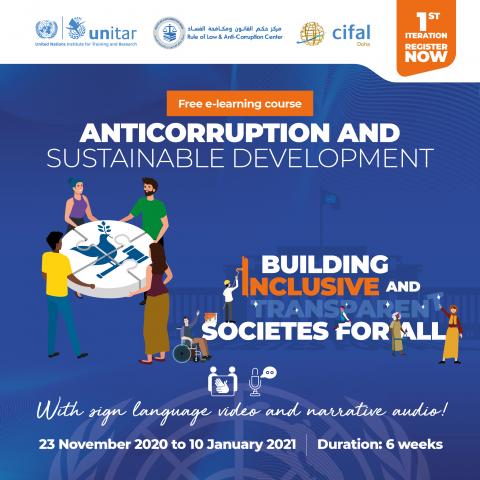
UNITAR Online Catalogue
Anticorruption and Sustainable Development

People
ROLACC
Background
Corruption hinders sustainable development in all countries. In order to tackle its root causes and consequences as well as to find solutions for prevention, accountability and redress, the impact of mainstreaming knowledge is a powerful resource towards transforming the lives of individuals and societies as a whole.
Mainstreaming knowledge about this problematic pursues the transformation of discriminatory social institutions, laws, cultural norms and community practices, such as those limiting access to property rights or restricting their access to public space.
In this regard, at international level there is a common agreement on the need of suppressing and preventing corruption because of its negative impacts and its ripple effects for employment, leadership, decision-making at all levels, among other repercussions. Therefore, the creation of spaces to raise awareness represents an opportunity to enhance capabilities and share good practices towards a culture of learning.
As a contribution to this endeavor, the Rule of Law and Anti-Corruption Centre (ROLACC) and the United Institute for Training and Research (UNITAR) have brought together their expertise and practical knowledge to collaboratively developed the e-learning course on “Anticorruption and Sustainable Development: Building inclusive and transparent societies for All”
Event Objectives
This e-learning course aims at strengthening the competences required for overcoming some of the challenges to combat corruption. In addition to learning its causes and consequences for sustainable development, participants will also understand the benefits of its prevention for the enhancement of the rule of law and the enjoyment of Human Rights.
Learning Objectives
At the end of the course, participants will be able to:
Describe different benefits of preventing and combating corruption because of its impact on sustainable development;
Recognize the challenges faced by individuals and society;
Identify ways to support anticorruption measures, in both developed and developing countries;
Content and Structure
MODULE 1 CLOSE UP ON CORRUPTION AND SUSTAINABLE DEVELOPMENT
• Knowledge empowerment on Corruption and Sustainable Development
• A snapshot of the core instruments and mechanisms at the international level
• The role of different actors involved in the prevention of corruption
MODULE 2 UNROLLING CORRUPTION CAUSES AND EFFECTS TOSUSTAINABLE DEVELOPMENT
• Learning from experience
• Common Iipacts on corruption to sustainable development
• Challenges caused by corruption
MODULE 3 FOSTERING ADEQUATE CONDITIONS FOR SUSTAINABLE DEVELOPMENT THROUGH PREVENTING CORRUPTION
• Optimizing the regulatory environment for the prevention of corruption
• Formulating a cohesive strategy on anticorruption for development
• Good practices in building community resilience for facing corruption
MODULE 4 STRENGTHENING SKILLS FOR TRAINING ON ANTI-CORRUPTION AND SUSTAINABLE DEVELOPMENT
• Raising awareness and promoting networking
• Public-private partnerships for transparency towards the achievement of 2030 Agenda for Sustainable Development
• Identification of important steps for training
Methodology
The course is based on UNITAR’s sound adult learning pedagogical principles. Each module includes readings, self-assessment activities and quizzes. The learning activities are distributed in such a way to ensure the achievement of the learning objectives in a flexible manner.
IMPORTANT NOTE: This course follows the UN Disability-Inclusive approach. It recognizes that combating corruption requires improving accessibility services, information, and participation of persons with disabilities. Therefore, this tool includes sign language video and narrative audio.
Targeted Audience
The course is designed for supporting delegates of States and other relevant stakeholders working on anticorruption and sustainable development from developed and developing countries.
Additional Information
A certificate of completion will be issued to participants who achieve a minimum total score of 70% in the average grade. A certificate of participation will be issued to participants who complete all mandatory activities.